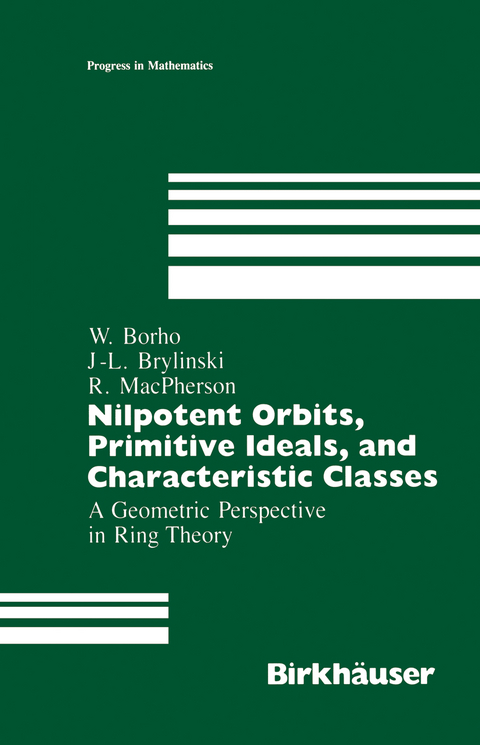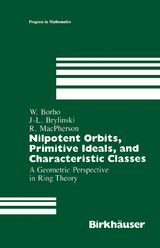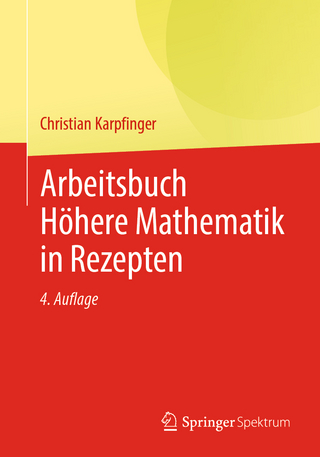Nilpotent Orbits, Primitive Ideals, and Characteristic Classes
Birkhauser Boston Inc (Verlag)
978-0-8176-3473-5 (ISBN)
General Introduction.- § 1. A Description of Springer’s Weyl Group Representations in Terms of Characteristic Classes of Cone Bundles.- 1.1 Segre classes of cone bundles.- 1.2 Characteristic class of a subvariety of a vector bundle.- 1.3 Characteristic class determined by a sheaf on a bundle.- 1.4 Comparison of the two definitions for Q.- 1.5 Homology of the flag variety.- 1.6 Cohomology of the flag variety.- 1.7 Orbital cone bundles on the flag variety.- 1.8 Realization of Springer’s Weyl group representation.- 1.9 Reformulation in terms of intersection homology.- 1.10 The Weyl group action.- 1.11 Reduction to a crucial lemma.- 1.12 Completion of the proof of theorem 1.8.- 1.13 Comparison with Springer’s original construction.- 1.14 Theorem: The maps in the diagram are W equivariant.- 1.15 Hotta’s transformation formulas.- § 2. Generalities on Equivariant K-Theory.- 2.1 Algebraic notion of fibre bundle.- 2.2 Equivariant vector bundles and definition of KG(X).- 2.3 Equivariant homogeneous vector bundles.- 2.4 Functoriality in the group G.- 2.5 Functoriality in the space X.- 2.6 The sheaf theoretical point of view.- 2.7 Existence of equivariant locally free resolutions.- 2.8 Remarks on Gysin homomorphisms in terms of coherent sheaves.- 2.9 Equivariant K-theory on a vector bundle: Basic restriction techniques.- 2.10 Filtrations on KG(X).- 2.11 Representation rings for example.- 2.12 Application of equivariant K-theory to D-modules.- § 3. Equivariant K-Theory of Torus Actions and Formal Characters.- 3.1 The completed representation ring of a torus.- 3.2 Formal characters of T-modules.- 3.3 Example.- 3.4 T-equivariant modules with highest weight.- 3.5 Projective and free cyclic highest weight modules.- 3.6 Formal characters of equivariant coherent sheaves.- 3.7Restriction to the zero point.- 3.8 Computation of ? degree.- 3.9 Character polynomials.- 3.10 Degree of character polynomial equals codimension of support.- 3.11 Positivity property of character polynomials.- 3.12 Division by a nonzero divisor.- 3.13 Proof of theorem 3.10 and 3.11.- 3.14 Determination of character polynomials by supports.- 3.15 The theory of Hilbert—Samuel polynomials as a special case.- 3.16 Restriction to one parameter subgroups.- 3.17 A lemma on the growth of coefficients of a power series.- 3.18 An alternative proof of theorem 3.10.- § 4. Equivariant Characteristic Classes of Orbital Cone Bundles.- 4.1 Borel pictures of the cohomology of a flag variety.- 4.2 Description in terms of harmonic polynomials on a Cartan subalgebra.- 4.3 Equivariant K—theory on T*X.- 4.4 Restriction to a fibre of T*X.- 4.5 Definition of equivariant characteristic classes.- 4.6 Comparison to the characteristic classes defined in §1.- 4.7 Equivariant characteristic classes of orbital cone bundles.- 4.8 Comparison with Joseph’s notion of “characteristic polynomials”.- 4.9 Generalization to the case of sheaves.- 4.10 Equivariance under a Levi subgroup.- 4.11 Multiple cross section of a unipotent action.- 4.12 For example SL2 equivariance.- 4.13 Completing the proof of theorem 4.7.2.- 4.14 Reproving Hotta’s transformation formula.- 4.15 On explicit computations of our characteristic classes.- 4.16 Example.- 4.17 Remark.- § 5. Primitive Ideals and Characteristic Classes.- 5.1 Characteristic class attached to a g module.- 5.2 Translation invariance.- 5.3 Characteristic variety of a Harish—Chandra bimodule.- 5.4 Homogeneous Harish-Chandra bimodules.- 5.5 Characteristic cycle and class of a Harish—Chandra bimodule.- 5.6 Identification with a characterpolynomial.- 5.7 Harmonicity of character polynomial.- 5.8 Equivariant characteristic class for a Harish—Chandra bimodule.- 5.9 Alternative proof of identification with character polynomials.- 5.10 Some non—commutative algebra.- 5.11 Definition of the polynomials PW.- 5.12 Relation to primitive ideals.- 5.13 Irreducibility of Joseph’s Weyl group representation.- 5.14 Irreducibility of associated varieties of primitive ideals.- 5.15 Evaluation of character polynomials.- 5.16 Computation of Goldie ranks.- 5.17 Joseph—King factorization of polynomials PW.- 5.18 Goldie ranks of primitive ideals.
| Reihe/Serie | Progress in Mathematics ; 78 |
|---|---|
| Zusatzinfo | VIII, 134 p. |
| Verlagsort | Secaucus |
| Sprache | englisch |
| Maße | 155 x 235 mm |
| Themenwelt | Mathematik / Informatik ► Mathematik ► Algebra |
| Mathematik / Informatik ► Mathematik ► Geometrie / Topologie | |
| ISBN-10 | 0-8176-3473-8 / 0817634738 |
| ISBN-13 | 978-0-8176-3473-5 / 9780817634735 |
| Zustand | Neuware |
| Informationen gemäß Produktsicherheitsverordnung (GPSR) | |
| Haben Sie eine Frage zum Produkt? |
aus dem Bereich




